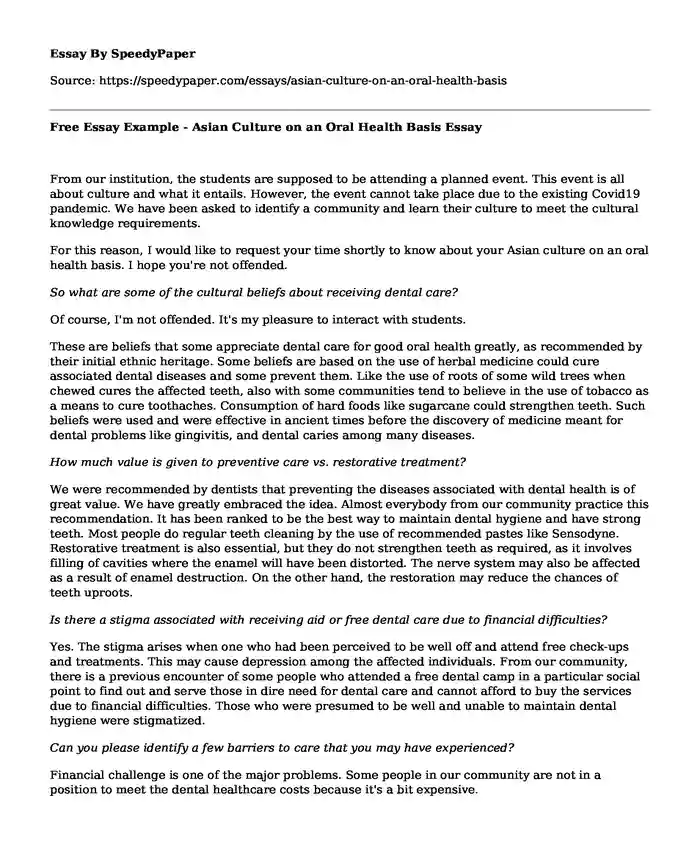
| Type of paper: | Essay |
| Categories: | Dentistry Healthcare Asia Covid 19 |
| Pages: | 3 |
| Wordcount: | 810 words |
From our institution, the students are supposed to be attending a planned event. This event is all about culture and what it entails. However, the event cannot take place due to the existing Covid19 pandemic. We have been asked to identify a community and learn their culture to meet the cultural knowledge requirements.
For this reason, I would like to request your time shortly to know about your Asian culture on an oral health basis. I hope you're not offended.
So what are some of the cultural beliefs about receiving dental care?
Of course, I'm not offended. It's my pleasure to interact with students.
These are beliefs that some appreciate dental care for good oral health greatly, as recommended by their initial ethnic heritage. Some beliefs are based on the use of herbal medicine could cure associated dental diseases and some prevent them. Like the use of roots of some wild trees when chewed cures the affected teeth, also with some communities tend to believe in the use of tobacco as a means to cure toothaches. Consumption of hard foods like sugarcane could strengthen teeth. Such beliefs were used and were effective in ancient times before the discovery of medicine meant for dental problems like gingivitis, and dental caries among many diseases.
How much value is given to preventive care vs. restorative treatment?
We were recommended by dentists that preventing the diseases associated with dental health is of great value. We have greatly embraced the idea. Almost everybody from our community practice this recommendation. It has been ranked to be the best way to maintain dental hygiene and have strong teeth. Most people do regular teeth cleaning by the use of recommended pastes like Sensodyne. Restorative treatment is also essential, but they do not strengthen teeth as required, as it involves filling of cavities where the enamel will have been distorted. The nerve system may also be affected as a result of enamel destruction. On the other hand, the restoration may reduce the chances of teeth uproots.
Is there a stigma associated with receiving aid or free dental care due to financial difficulties?
Yes. The stigma arises when one who had been perceived to be well off and attend free check-ups and treatments. This may cause depression among the affected individuals. From our community, there is a previous encounter of some people who attended a free dental camp in a particular social point to find out and serve those in dire need for dental care and cannot afford to buy the services due to financial difficulties. Those who were presumed to be well and unable to maintain dental hygiene were stigmatized.
Can you please identify a few barriers to care that you may have experienced?
Financial challenge is one of the major problems. Some people in our community are not in a position to meet the dental healthcare costs because it's a bit expensive.
Lack of access to dental healthcare facilities. This as a result of poor infrastructure at some points and the facilities has been located far from such individuals.
In young children, barriers are dependent on the attitude of the parents toward dental plans and interests.
The need perception among the people in the community. Some people may be attending dental clinics because of associated dental pains. Some people attend clinics regularly. Social factors may result to lower turn up the rate as most people use public means of transport. Another barrier is dental anxiety for some groups of people.
I know you're a bonafide member of this community and the cultural heritage. So tell me how does this culture influence the delivery/acceptance of dental hygiene care?
It fully supports the idea of dental care in the community. We embrace dental hygiene care, thus creating smooth running and delivery of dental care services from these service providers. Stigmatization is not so rampant; hence they do not hinder the service delivery because there are only a few cases since most people tend to know the importance of having regular visits to dental healthcare centers.
Supposed you are asked to come up with treatment suggestions, would you formulate treatment in any way?
Somehow. I could combine some herbs to ensure that I get the most appropriate combination having a high medicinal value in the sense of curbing dental healthcare issues. Traditional knowledge of medicinal plants is highly appreciated in this aim of modifying treatment.
Reference
Brownstone, E. G. (2007). A qualitative study of the occupational status and culture of dental hygiene in Canada. https://mspace.lib.umanitoba.ca/handle/1993/1666Fitch, P. (2004). Cultural competence and dental hygiene care delivery: integrating cultural care into the dental hygiene process of care. Journal of Dental Hygiene, 78(1).
Choi, E. M., Noh, H. J., Chung, W. G., & Mun, S. J. (2017). Perception of infection control activities and patient safety culture among dental hygienists. Journal of Korean Society of Dental Hygiene, 17(5), 769-777. http://www.koreascience.or.kr/article/JAKO201732663235869.page
Cite this page
Free Essay Example - Asian Culture on an Oral Health Basis. (2023, Aug 08). Retrieved from https://speedypaper.com/essays/asian-culture-on-an-oral-health-basis
Request Removal
If you are the original author of this essay and no longer wish to have it published on the SpeedyPaper website, please click below to request its removal:
- Free Essay on Concept Definition of Stress
- Pathway to Safer Opioid Use - Paper Example
- Paper Example. Critique Of A Health Care Website
- Essay Sample on Agency, Practice, and Regimes of Power
- Legalizing Medical and Recreational Marijuana Increases Drug Use: Reflection Example
- Free Essay Sample on Theory Practice
- Medieval Turmoil and Transformations: From Crisis to Renaissance - Free Essay Sample
Popular categories




